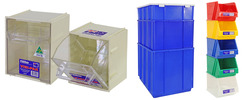Garbage Bins: Managing Waste Efficiently and Sustainably
Date Posted:2 July 2024
Garbage bins are essential components of waste management systems, providing a practical and efficient solution for collecting, containing, and disposing of waste in urban and rural environments.
Garbage bins, also known as trash cans or waste receptacles, are ubiquitous fixtures in cities, neighborhoods, and public spaces around the world. These containers play a crucial role in managing waste and maintaining cleanliness in urban and rural environments. In this article, we explore the functionality, benefits, and diverse applications of garbage bins, highlighting their importance in promoting efficient waste management practices and environmental sustainability.
Functionality and Design
Garbage bins are designed to hold and store waste until it can be collected and disposed of properly. They come in various shapes, sizes, and materials, ranging from small household bins to large industrial containers. Common materials used in garbage bin construction include plastic, metal, and concrete, each offering different levels of durability, weather resistance, and aesthetic appeal. Garbage bins may feature lids, handles, or wheels for ease of use and maintenance.
Efficient Waste Collection
One of the primary functions of garbage bins is to facilitate efficient waste collection and disposal. Garbage bins are strategically placed in public spaces, residential areas, commercial buildings, and industrial facilities to provide convenient access for waste disposal by residents, workers, and visitors. Regular collection schedules ensure that bins are emptied and waste is transported to appropriate disposal sites, such as landfills or recycling centers, in a timely manner.
Promoting Recycling and Waste Segregation
Garbage bins play a crucial role in promoting recycling and waste segregation efforts in communities. Many municipalities and waste management authorities provide separate bins for different types of waste, such as recyclables, organic waste, and general waste. This encourages residents and businesses to separate their waste at the source, making it easier to recycle and divert materials from landfill. Garbage bins may be color-coded or labeled to indicate the type of waste they are intended for, further simplifying the segregation process.
Reducing Litter and Environmental Pollution
Properly placed and maintained garbage bins help reduce litter and environmental pollution by providing a designated and secure storage solution for waste. By preventing waste from being discarded or scattered indiscriminately, garbage bins help maintain cleanliness and aesthetics in public spaces, parks, streets, and beaches. Additionally, garbage bins with secure lids help contain odors and prevent animals from accessing and dispersing waste, further mitigating environmental impacts.
Supporting Public Health and Safety
Garbage bins play a critical role in supporting public health and safety by minimizing the risk of disease transmission and pest infestations associated with improper waste disposal. By providing a hygienic and sanitary means of waste containment, garbage bins help prevent the spread of bacteria, viruses, and other pathogens that can pose health risks to humans and animals. Additionally, proper waste management practices help control pests such as rodents, insects, and scavenging animals, reducing nuisances and potential health hazards in urban and rural areas.
Garbage bins are essential components of waste management systems, providing a practical and efficient solution for collecting, containing, and disposing of waste in urban and rural environments. Through their functionality, design, and widespread availability, garbage bins contribute to promoting efficient waste management practices, environmental sustainability, and public health and safety. As communities continue to prioritize waste reduction, recycling, and environmental stewardship, the importance of garbage bins in managing waste efficiently and sustainably will only continue to grow.





























































































 Trolleys / Hand Trucks
Trolleys / Hand Trucks 2 Tier Trolleys
2 Tier Trolleys 3 Tier Trolleys
3 Tier Trolleys Aluminium Trolleys
Aluminium Trolleys Appliance & Hand Trucks
Appliance & Hand Trucks Cage Trolleys
Cage Trolleys Cleaning Carts & Trolleys
Cleaning Carts & Trolleys Construction Trolleys
Construction Trolleys Dollies
Dollies Foldable Trolleys
Foldable Trolleys Hospital Trolleys
Hospital Trolleys Laundry/Linen Trolleys
Laundry/Linen Trolleys Load Skates & Tow Tugs
Load Skates & Tow Tugs Mail / Office Trolleys
Mail / Office Trolleys Multi Purpose Trolleys
Multi Purpose Trolleys Multi-Tier Shelf Trolleys
Multi-Tier Shelf Trolleys Order Picking Trolleys
Order Picking Trolleys Panel Cart Trolleys
Panel Cart Trolleys Platform Trolleys
Platform Trolleys Powered Trolleys
Powered Trolleys Stainless Steel Trolleys
Stainless Steel Trolleys Tool Trolleys
Tool Trolleys Utility Carts
Utility Carts Warehouse Trolleys
Warehouse Trolleys Custom Trolleys
Custom Trolleys Lifting Equipment
Lifting Equipment Forklift Attachments
Forklift Attachments Jib Attachments
Jib Attachments Lifting Hoists & Pallet Hooks
Lifting Hoists & Pallet Hooks Manual Stackers & Lifters
Manual Stackers & Lifters Pallet Jacks
Pallet Jacks Pallet Lifters
Pallet Lifters Pallet Rotators & Dispenser
Pallet Rotators & Dispenser Powered Pallet Trucks & Electric Lifters
Powered Pallet Trucks & Electric Lifters Scissor Lift Trolleys and Tables
Scissor Lift Trolleys and Tables Conveyor Equipment
Conveyor Equipment Conveyor Frames
Conveyor Frames Conveyor Stands
Conveyor Stands Roller Conveyors
Roller Conveyors Skate Wheel Conveyors
Skate Wheel Conveyors Access Equipment
Access Equipment Container & Yard Ramps
Container & Yard Ramps Step Stools & Ladders
Step Stools & Ladders Work Platforms & Crane Cages
Work Platforms & Crane Cages Drum Handling
Drum Handling Drum Storage & Bunding
Drum Storage & Bunding Drum Trolleys & Lifters
Drum Trolleys & Lifters Forklift Drum Handling
Forklift Drum Handling Containment & Spillage
Containment & Spillage Aerosol Cans Storage Cages
Aerosol Cans Storage Cages Bunded Pallets & Storage
Bunded Pallets & Storage Corrosive Goods Storage Cabinets
Corrosive Goods Storage Cabinets Flammable Liquid Cabinets
Flammable Liquid Cabinets Forklift Gas Storage Cages
Forklift Gas Storage Cages Gas Cylinder Storage
Gas Cylinder Storage Site Storage
Site Storage Spill Kits
Spill Kits Stillage Cages
Stillage Cages Waste Handling
Waste Handling Bin Lifters & Tippers
Bin Lifters & Tippers Plastic Waste Bins and Carts
Plastic Waste Bins and Carts Steel Waste and Tipping Bins
Steel Waste and Tipping Bins Storage Equipment
Storage Equipment Heavy Duty Cabinets & Benches
Heavy Duty Cabinets & Benches Heavy Duty Shelving
Heavy Duty Shelving Mega Bins & Pallets
Mega Bins & Pallets Packing Benches
Packing Benches Pallet Racking Accessories
Pallet Racking Accessories Parts Trays & Stor-Pak Bins
Parts Trays & Stor-Pak Bins Pegboard & Louvre Panels
Pegboard & Louvre Panels Plastic Bins
Plastic Bins Plastic Handling Solutions Bins
Plastic Handling Solutions Bins Plastic Pallets
Plastic Pallets Stack & Nest Bins
Stack & Nest Bins Storage Cages
Storage Cages Workplace Equipment
Workplace Equipment Workbenches
Workbenches Modular Workbenches
Modular Workbenches Electric Height-Adjustable Workbenches
Electric Height-Adjustable Workbenches Floor Matting
Floor Matting Industrial Weighing Scales
Industrial Weighing Scales Pallet Wrapping & Packaging Machinery
Pallet Wrapping & Packaging Machinery Ramps
Ramps Stationery Cupboards
Stationery Cupboards Storage and Stillage Cages
Storage and Stillage Cages Tool Trolleys
Tool Trolleys Tooling Cabinets
Tooling Cabinets Wheelie Bins
Wheelie Bins Workshop Equipment
Workshop Equipment Safety Equipment
Safety Equipment Gloves and PPE
Gloves and PPE Pallet Rack Post Protectors
Pallet Rack Post Protectors Safety Barriers & Bollards
Safety Barriers & Bollards Safety Knives & Cutters
Safety Knives & Cutters Signs and Traffic Supplies
Signs and Traffic Supplies Tool & First Aid Boxes
Tool & First Aid Boxes Construction Equipment
Construction Equipment Concrete Equipment
Concrete Equipment General Site Equipment
General Site Equipment Lifting Equipment
Lifting Equipment Site Storage
Site Storage Waste
Waste 










